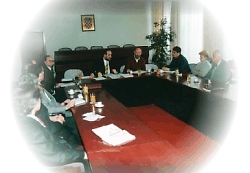

Humanitarian proposals
3. THE PROTECTION OF ENDANGERED GROUPS
AND INSTITUTIONS
3.1. The Global Hospital
We propose the improvement of hospital organization during wars and other forms of violence, general strife and times when normal hospital operations are impeded. The proposal is based on changes in modern technology in medicine and communications, the increase in the destruction and prevention of hospital operations in modern wars, the changing face of illness and breakthroughs in public health and human rights in this field.
Every hospital in the world has the right to become a member of a global hospital which will determine the following:
1. that hospitals register with the Red Cross, which will head the organization of the global hospitals program;
2. that during conflicts hospitals become neutral territory (UN);
3. that hospitals have international administrators during times of general strife;
4. that hospitals be committed to receive all patients, regardless of nationality, race, language, sex, age, social status, political affiliation, health or loyalty to either conflicting party;
5. that these hospitals receive supplies from the international organizations if needed;
6. that such hospitals have sister hospitals in secure territories with which they cooperate, and which will offer them support in professional consultations, representation before the international community, providing assistance and by other means;
7. that during times of general strife the hospital submits daily reports on its functioning and general situation (safety, supplies…). The UN (WHO) and the public will be regularly informed through CNN or the Internet;
8. that in cases of emergency the UN (Secretary General, Security Council) and the public (CNN, Internet and other media), who are obliged to offer direct assistance, are informed.
The current forms of hospitals under wartime circumstances have stagnated considerably, and they do not satisfy minimum needs (safety, supplies, information, care for patients dependent on technology/dialysis, intensive care, incubators, chemotherapy…). The modern hospital is a technological center, immobile and dependent, both on energy supplies and in other ways. New human rights possibilities have not be utilized (UN neutrality, public support and the entire computer and communications revolution) in conjunction with the growth in the global importance of health and human rights.

3.2. Prisoner of War Camps
1. Prisoner of war camps must be registered with the International Committee of the Red Cross (ICRC) immediately upon their establishment;
2. The failure to register camps is a war crime on the part of the party that establishes the camp, and this party will be directly responsible for all further developments in the camp;
3. Immediately upon receiving this information, the ICRC must designate a permanent representative who will reside in the camp as long as it is in operation. The international representative will be obliged to monitor the observance of the existing regulations, regularly submit reports on conditions in the camp and undertake all necessary measures as needed;
4. The UN (Department of Human Rights) and the public (CNN; the Internet and other media) must be regularly informed;
5. In cases of emergency, the representive will inform the UN (Secretary General, Security Council) and the public (CNN, the Internet and other media), who will be obliged to offer direct assistance.
The existing forms of humantarian protection provided to prisoner of war camps do not include the obligation of registration, constant international presence nor sufficiently effective monitoring and action.
3.3 Refugee Camps
1. Refegee camps must be registered with the UNHCR immediately upon their establishment;
2. The UNHCR must designate a permanent commissioner who will reside in the camp as long as it is in operation;
3. The UN (Department of Human Rights) and the public (CNN, the Internet and other media) must be regularly informed of the situation in the camps;
4. In case of emergency, the UNHCR will be obliged to inform the UN (Secretary General, Security Council) and the public (CNN, the Internet and other media).
3.4. Care for the Abandoned
When the majority of the population massively departs from an area, regardless of the cause, the rest of the population nevertheless remains and this leads to social collapse. This remaining or abandoned part of the population, generally the sick and elderly who are not mutually connected in any way, is exposed to great additional risks.
Up to the present, humanitarian care for displaced persons and refugees, and for detained persons or persons living in occupied territories, has been developed, but the same cannot be said for abandoned populations.
Care for abandoned populations was defined and implemented for the first time in Croatia in 1995. An abandoned population is a new humanitarian category, and it will be necessary to systematize and develop care for them.
We would particularly like to note our experience, which has
shown that such populations are generally elderly persons seeking additional forms of
humanitarian protection. This too has yet to be adequately defined.
...